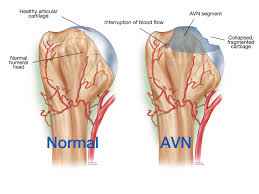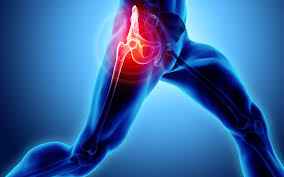Do you observe a limited range of motion due to pain? It could be because of Avascular Necrosis. This is a painful bone condition that can impact the quality of life and also affect daily activities. To get AVN treatment in Mathura, you can consult Dr. Swapnil Verman, the best orthopaedic surgeon in Mathura, providing personalised treatment plans suited to your specific body type. Read this article to get more information on AVN, causes, and risk factors that lead to AVN progression to help detect and manage AVN in its early stage.
Avascular Necrosis Treatment in Mathura: An Overview
AVN, or Avascular Necrosis, is also known as Osteonecrosis, in which there is temporary or permanent loss of blood supply to the bone. This medical condition can result from various different factors such as trauma, injury, or any fractures. AVN can affect different parts of the body like the hip, shoulder, knee, and ankle. Each type of AVN shows different symptoms and requires tailored treatment approaches.

AVN can progress through various stages; therefore, understanding the causes and risk factors is essential for the early detection and treatment of the condition.
Stages of AVN Progression
AVN usually progresses through four stages:
Stage 1: Disruption of blood flow
This is the initial stage of AVN progression, under which there is reduced or disrupted blood supply to the bone.
Stage 2: Early bone damage
In the second stage, affected bone begins to weaken because of less or no blood supply to the bone joints. This condition can cause more noticeable pain in the affected part than before.
Stage 3: Collapse of the Joint Surface
As AVN develops to its third stage, the weakened bone may collapse, leading to deformities in the joint surface. The bone and joint damage can be easily visible in X-rays.
Stage 4: Advanced Joint Damage
The advanced stage of AVN can cause severe joint damage and arthritis. This condition can lead to chronic pain, and in such cases, the joint can also lose its function entirely. People with advanced joint damage often need total joint replacement surgery to restore the normal functioning of the joint.
The early detection and right treatment approach can significantly slow down the progression of AVN and can also alleviate pain and stiffness and improve mobility and joint function.
What Causes AVN?
There are several different causes that can lead to avascular necrosis, which include the following:
●Dislocated joint
●Trauma or injury to the affected joint
●Radiation therapy
●Prolonged use of certain medications
●Blood clotting disorders
●Radiation therapy
●Frequent inflammation in the joints
●Excessive alcohol consumption
●Uncontrolled diabetes

What Are the Risk Factors for AVN Progression?
These are some of the factors that can increase the likelihood of developing or worsening AVN:
Certain habits, such as excessive consumption of alcohol and smoking, can increase fat deposits in the blood vessels and reduce blood flow to the bones, which can cause pain and reduced mobility.
People who are dealing with health conditions like diabetes and HIV/AIDS are at higher risk of developing avascular necrosis due to poor blood circulation.
Sudden changes in the joint movement or position such as fractures or dislocations can block the blood flow to the bone joints and lead to AVN.
If you are dealing with chronic joint conditions such as arthritis, you are at greater risk of developing AVN.

Struggling with AVN? Consult Dr. Swapnil Verman for AVN Treatment in Mathura.
Avascular Necrosis, or AVN, is a painful condition that is caused by reduced blood flow to the bone joints. By understanding the causes and risk factors of the condition, early detection and treatment are possible. If you are seeking AVN treatment in Mathura, you can consider consulting Dr. Swapnil Verman, the best orthopaedic specialist in Mathura.

